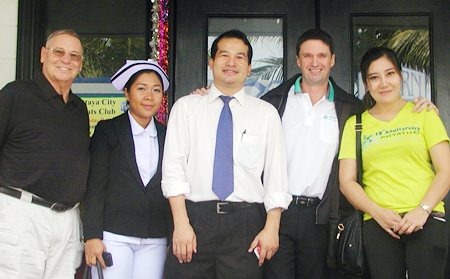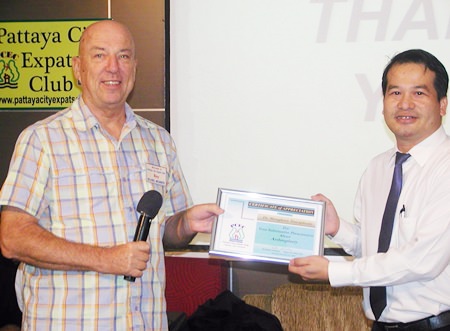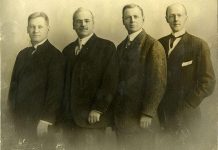You don’t have to feel the pain; at least not to a great degree. This was the message to the Pattaya City Expats Club on Sunday, December 15. Dr Mungkorn Teeyaphudit, an orthopaedist from Phyathai Hospital Sriracha, spoke on the topic “Current and Innovative Pain Management Techniques in Total Knee Arthroplasty.” Dr. Mungkorn received his medical degree from Thammasat University (Bangkok) where he also graduated as a fellow in Orthopaedic Surgery and in Arthroplasty Joint Replacement as a Subspecialty.
Although knee pain can be debilitating, whether it comes from damage to a knee that needs to be treated, or from the treatment itself, fortunately, the pain from the treatment is usually short-lived. And new pain management techniques have been developed that reduce reliance on morphine as a pain management tool explained Dr. Mungkorn.
 Member Bruce, Dr Mungkorn, Gavin and the Phyathai staff providing much appreciated free blood pressure checks, pose after the meeting.
Member Bruce, Dr Mungkorn, Gavin and the Phyathai staff providing much appreciated free blood pressure checks, pose after the meeting.
The most common problem patients experience following a total knee replacement is post operative knee pain. Total knee replacement, also known as total knee Arthroplasty is a surgical procedure in which parts of the knee joint are replaced with artificial parts (called prostheses).
Why treat the pain, Dr Mungkorn asked? Apart from the obvious reasons to reduce pain and suffering, improve quality of life and speed up of recovery; if the pain is not relieved, serious complications are possible. These complications can be cardiovascular (e.g. increased blood pressure and heart rate); respiratory (e.g. decreased lung capacity, retention of secretions); and gastrointestinal (e.g. food staying in the stomach longer than normal, and constipation). Further, other possible complications of unrelieved pain are immobility, weakness, fatigue and sleep deprivation.
Analgesic drugs are used to treat post-operative pain. If the pain is mild to moderate, Dr Mungkorn said, doctors usually prescribe non-opioids, anti-inflammatory drugs or paracetamol. To treat moderate to severe pain, mild opioids (such as codeine) are used, with or without non-opioids. Finally, for severe pain, doctors will prescribe strong opioids (such as morphine), with or without non-opioids. Also, administering too much morphine creates problems. Apart from the fact that the drug is addictive, morphine has side effects, such as headaches, nausea and dizziness. So, new approaches have been developed to provide alternatives to the use of morphine. He mentioned that these approaches include pre-emptive analgesia and multimodal analgesia; using the two approaches in combination provides optimal pain control.
 MC Roy Albiston presents Dr Mungkorn with a Certificate of Appreciation as thanks for his very informative talk.
MC Roy Albiston presents Dr Mungkorn with a Certificate of Appreciation as thanks for his very informative talk.
Pre-emptive analgesia involves administering treatment before the surgical procedure in order to reduce the sensitisation of the body’s central and peripheral pain pathways that knee surgery creates. Multimodal analgesia involves the use of different classes of analgesics and different sites of analgesic administration to provide improved pain relief with reduced side effects. Multimodal analgesia is associated with lower use of opioids.
Dr Mungkorn explained that four options are available for the anaesthetic used for a knee operation: spinal block, general anaesthesia, epidural block and peripheral nerve block. He said that he prefers to use the spinal block technique. To manage pain during and immediately after the operation, many doctors, he included, are using a peri-articular anaesthetic cocktail where portions of the cocktail are applied to different tissues surrounding the knee joint.
In his experience, Dr Mungkorn said, the cocktail helps to reduce pain to a score of 3-4 compared to a pain score of 6-7 without the cocktail (the higher the number, the greater the pain).
In summary, Dr Mungkorn said, he uses four techniques to manage pain associated with knee surgery: (1) pre-emptive analgesia; (2) spinal anaesthesia; (3) anaesthetic cocktail during surgery; and (4) post-operative anaesthesia.
After Dr. Mungkorn answered several questions, Master of Ceremonies Roy Albiston brought everyone up to date on upcoming events and called on Tony Heron to conduct the Open Forum, where questions are asked and answered about Expat living in Thailand, especially Pattaya.
To learn more about the Club and their many activities, visit www.pattayacityexpatsclub.com.




